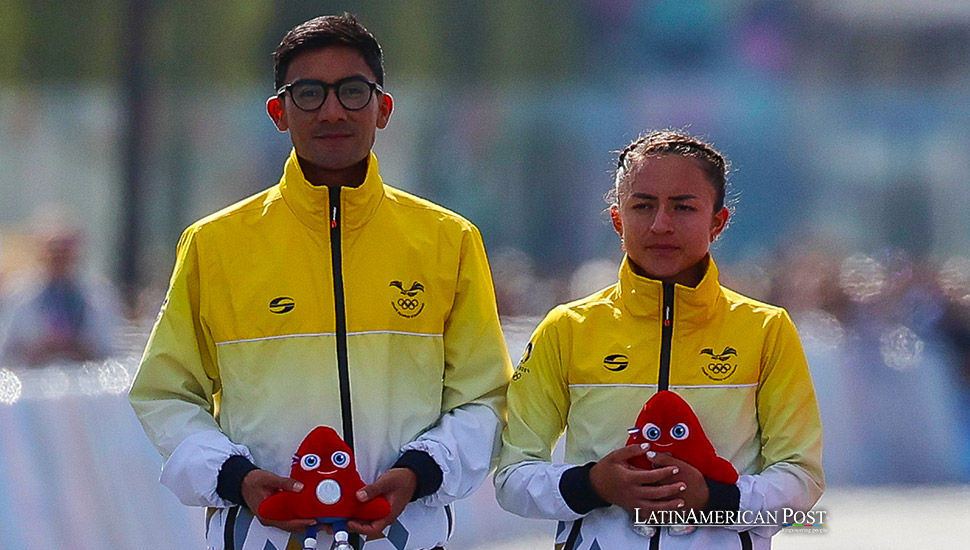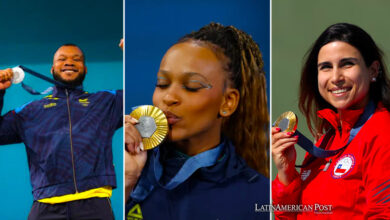Ecuadorian Daniel Pintado’s Tenacity and Olympic Glory

Ecuadorian racewalker Daniel Pintado, who won gold in the 20-kilometer event at the Paris 2024 Olympics, credits his success to his family’s unwavering support and relentless determination. His journey from humble beginnings to Olympic champion inspires Ecuador and beyond.
Daniel Pintado’s journey to Olympic gold began in the most modest circumstances. Born into a family of limited means in Ecuador, Pintado’s introduction to sports was marked by a collective family effort. In a press conference held in Quito, Pintado recounted how his first pair of sports shoes came from a family collection. “When I started in sports, my first pair of shoes was bought through a collection from all my sisters, apart from my dad, and apart from my mom, so my brother and I could have our pair,” he shared.
This early support laid the foundation for Pintado’s career, instilling in him the belief that, despite financial hardships, he could achieve greatness with the backing of his loved ones. Pintado’s story is a testament to the power of familial support in overcoming obstacles, a theme that resonates deeply in a country where many athletes face similar challenges. His success is not just his own but a shared victory with those who initially believed in him.
Pintado’s early life was filled with challenges, yet his parents’ faith in his potential never wavered. At 19, he became a father, welcoming his son Nicolás into the world. Many warned that fatherhood might derail his athletic career, but Pintado saw it differently. “Since Nico was born, life has been different. That’s when my athletic career began,” he recalled. Instead of being a distraction, his son became a source of motivation, pushing him to strive for excellence in every competition.
From Local Competitions to Global Success
Pintado’s rise in race walking was not without its struggles, but his tenacity and the support of his coach, Andrés Chocho, were crucial in his development. “With Chocho, I started growing significantly. We were already fourth in the world, then second, and by 2023, I could celebrate like Cristiano Ronaldo,” Pintado said, referencing his famous “Siuu” celebration. This period marked a significant transformation in his career as he began to see the results of his hard work on the global stage.
Despite his success, Pintado confessed to moments of self-doubt. Before traveling to France for the Paris 2024 Olympics, he had publicly declared that he would bring home a gold medal. However, as the competition approached, nerves set in. “The night before the competition, I was super, super nervous. I only managed to hold back tears because of the encouraging words from my son, who was in Ecuador,” he revealed.
His son’s words, spoken over a phone call, provided the calm and reassurance Pintado needed. “Don’t worry, Dad, no matter what happens, you’re already a champion with everything you’ve done. We’re proud of you. Just go out there and do what you always do,” Nicolás told him. With these words in his heart, Pintado managed to sleep only 90 minutes before the biggest race of his life.
The race itself went according to plan, with Pintado maintaining control throughout. As he entered the final kilometer, the competition became more than a physical challenge. “The last kilometer wasn’t a race against my rivals but a more spiritual competition, thinking about my children, my family, my team, and those who supported me—and even those who turned their backs on me,” he said. This introspective approach fueled him as he crossed the finish line, earning the gold medal he had promised.
Emotional and Spiritual Challenges
As Pintado neared the finish line, the weight of his journey pressed on him. “When only 100 meters left, I asked myself if I would be an Olympic champion. I couldn’t believe it was happening,” he said, describing the disbelief and emotion that flooded him in those final moments. His victory in Paris was the culmination of more than 20 years of dedication, earning him an individual gold medal and a silver in the mixed relay walk alongside Glenda Morejón.
Morejón, another prominent figure in Ecuadorian race walking, shared her own story of perseverance at the press conference. She spoke about how her father saw sports as a means of bettering their family’s situation. Despite his efforts to involve other family members in athletics, only Glenda continued with the discipline. She recalled winning her first 300-meter race at five, only to give up the sport at ten because she didn’t enjoy it.
However, her passion for sports was reignited when she became a school baton twirler. Unable to afford the uniform, her father lent her the money, which she repaid by selling watermelons at the market where her mother worked. This experience marked the beginning of her return to race walking, where she has since achieved significant victories for Ecuador. Like Pintado’s, her story underscores the crucial role of family in overcoming adversity and achieving success.
Emotional and spiritual aspects of competition are often overlooked, yet they play a critical role in an athlete’s performance. For Pintado, the final stretch of his race was not just about winning but about honoring the years of sacrifice, support, and belief that had brought him to that moment. His victory was as much about mental and emotional resilience as physical endurance, which adds depth to his achievement.
Dreams, Reality, and Responsibility
In a conversation organized by Banco Pichincha, which supports Ecuadorian athletes Pintado and Morejón, he discussed the importance of their roles as role models for the younger generation. “You prepare a lot physically and athletically to win an Olympic medal,” Pintado said, acknowledging that he wasn’t prepared for the wave of popularity that followed his victory. Despite the fame, he remains grounded, always ready to pose with a smile for anyone who asks for a photo.
Pintado’s return to his hometown of Cuenca was a moment of realization for him. The massive reception he received made him fully understand the impact of his achievement. “It was only when I arrived in Cuenca, with such a huge popular reception, that I realized the magnitude of what was happening,” he recalled. He was reminded of his idol, Jefferson Pérez, Ecuador’s first Olympic race walking medalist, who once told him, “The real medal isn’t the metal one but all the people and stories that come through it.”
With his Olympic triumph, Pintado now carries the responsibility of being a symbol of hope and determination for many. “Now we have a new responsibility to be the reference and example for others,” he emphasized, expressing his desire to show that “dreams can become reality with hard work and discipline.”
Also read: Shaun Gill’s Unique Experience as Belize’s Lone Olympic Representative in Paris
Pintado’s journey from a young boy needing shoes to an Olympic champion is a story of resilience, family support, and unwavering dedication. His success is a beacon for aspiring athletes in Ecuador and beyond, demonstrating that anything is possible with determination and the proper support. As he steps into his new role as a national icon, Pintado is committed to inspiring others to pursue their dreams, proving that no matter where you start, greatness is within reach.





